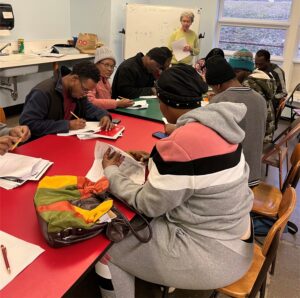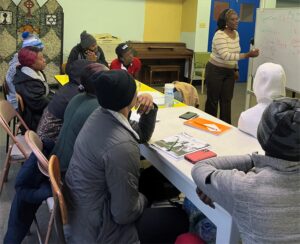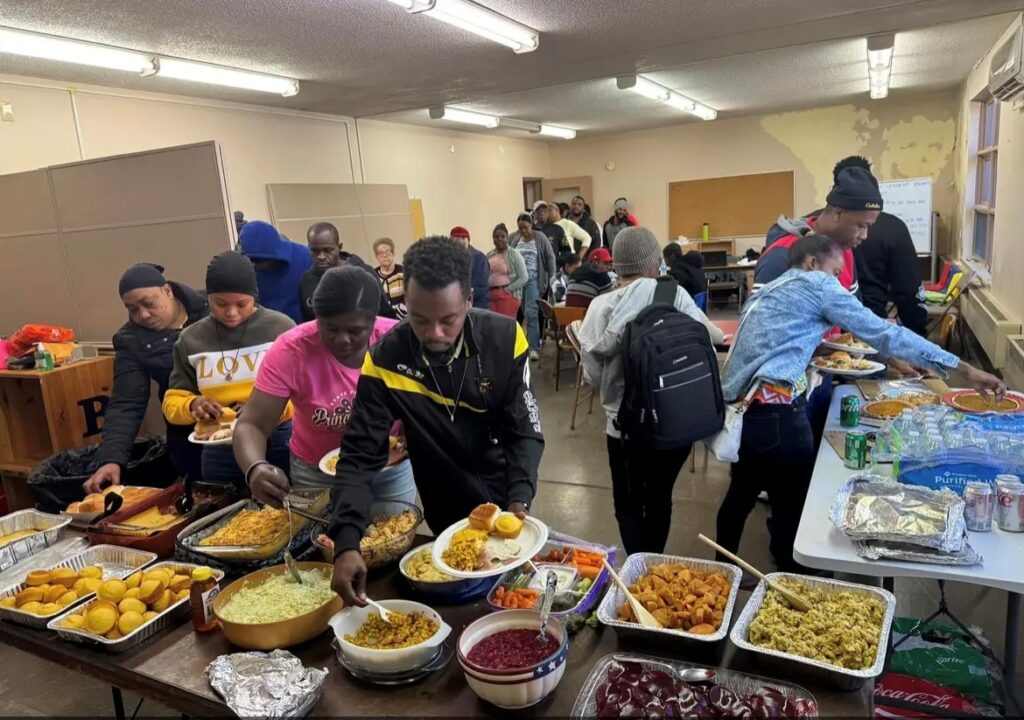
Haitian refugees take part in an English is a Second Language class at Charleroi Presbyterian Church in Washington County, PA, where an estimated 2,000 immigrants have settled in recent years.
Street gangs are ruling cities and towns in Haiti. The prevalence of violence has left some to refer to what remains as a “mini-Mafia state,” with the militant groups earning money through kidnappings, extortion, drugs and weapons smuggling. With little army or national police to regain control, political leaders are using armed civilians to help restore order in the Central American country. What remains is mass chaos, with people continually fearing for their lives and their family’s safety.
Because of the violent unrest in the Caribbean nation, which is also among the poorest counties in the world with an estimated poverty level of 60 percent, Haitians are exiting their homelands searching for a new place to live. One of those landing spots is Washington County, PA, specifically the community of Charleroi where an estimated 2,000 Haitians have found a new home thanks mainly to employment opportunities in the local factories.
“It is as if their whole society has stopped,” explained the Rev. Sharon Woomer, pastor at the Charleroi Presbyterian Church. “In Haiti, it’s just pure devastation. There’s physical devastation from natural calamities, but it’s also the widespread violence and lack of safety.
“There were people that were able to come in from Haiti leaving middle level positions, obviously escaping incredibly horrific life situations. They found employment working in several local food service factories. Just about everyone in the Charleroi community would say they’re still surprised and stunned at the situation that’s going on.”
The increase in the Haitian population in Charleroi, with a population of 4,200, has put a huge strain on the community. Religious and civic organizations are stepping up to provide services and resources for the immigrants (who are here legally), and one of those groups is the Charleroi Presbyterian Church.
“Some of this current migration happened during Covid, so it wasn’t as obvious what was happening,” Sharon explained. “Charleroi is a small town. The city could not have had the infrastructure to deal with this, and it doesn’t.
“The educational system is coping as well as it can. There’s been a series of roundtables that will continue to try to figure out how to meet the needs. Families are now bringing their children, having their children come with them or they’re sending for their children to come and join them. There are over 100 kids in the elementary system that don’t speak English and they need care and attention.
“It’s a real sudden problem for people here trying to help grief-stricken families and individuals get established. Most of the Haitians live in the Charleroi community and don’t have their own transportation. They can get picked up in vans to go to work, but then they’re walking to go to church, to go to literacy, to go shopping. Everything is happening right there in the center of this little town.”
Among the important needs in Charleroi for the Haitian community is learning English as a Second Language (ESL) classes, which Charleroi Presbyterian hosts on Sunday afternoons and Tuesday and Thursday mornings.
“Our interactions are very open and friendly, and the adult students are very courteous, eager and easy to be with,” Sharon said of the classes. “There’s a cultural difference, of course, but communication is well received on both sides. It’s inspiring to be together.”
 This has been quite an undertaking for Charleroi Presbyterian, which has a weekly worship attendance of around 20 and may have been looking at closing its doors had this Haitian situation not arose. Now the church can remain open because of the need that has surfaced, donors who are putting money toward the literacy classes and the fundraising efforts by the congregation.
This has been quite an undertaking for Charleroi Presbyterian, which has a weekly worship attendance of around 20 and may have been looking at closing its doors had this Haitian situation not arose. Now the church can remain open because of the need that has surfaced, donors who are putting money toward the literacy classes and the fundraising efforts by the congregation.
When registration for the literacy classes opened a year ago, around 100 people showed up to take advantage of the opportunity. Sharon is one of the volunteer teachers who donates her time for this important outreach.
“I have developed relationships with the students in the classroom because of what is true for all of us – the real human connection,” Sharon said, “and it’s inspiring to sit with people who have been through all the traumatic things you might imagine and yet having the courage to leave their homeland and start over. I am benefiting from knowing them. There is no question this is personally a blessing. It really is a reciprocal thing.”
The church also hosts a monthly food distribution from a local food bank, a frequency that may increase to twice a month this spring. Household goods and coats are also available at the church for those in need, and other outreach events such as Vacation Bible School are planned for later in the year.
With so much need in their community, Charleroi Presbyterian has shared the situation with Washington Presbytery and has in return received an outpouring of support. One of the current needs is for individuals willing to do one-hour presentations at the church focusing on things like applying for jobs, community college and general life skills. Sharon is developing small group ministry opportunities for pastoral support as people continue to struggle with and process these traumatic circumstances.
Aside from the need for continued prayer and financial support, the church is seeking some “extra hands” to help with some of their outreach events, like VBS or a community meal.
“As people of faith, we’re doing all of these things in Christ’s name,” Sharon said. “We’re also trying to be a welcoming worshiping community. One of the ways that we’re hoping to do that is through music with the Haitians eventually sharing their musical gifts as a part of worship.”
With all that is happening in Charleroi and the activities being supported by the church and community, Sharon is moved by the outpouring of support that is coming in.
“I have been in this area for almost 23 years, and this is the most exciting part of ministry I’ve had in decades,” Sharon said. “It’s a real blessing to be here.”
There’s still a long journey ahead for Charleroi and the Haitians who are calling it home, but the progress that’s been made in welcoming the refugees to Washington County continues to increase and be a blessing for all involved.
“When I talk to people here in the presbytery, it can feel that the need is almost overwhelming,” Sharon said. “That part is true. But there is so much of God’s abundance, so much movement of the Spirit, so many things showing up that people had always prayed about. It is an amazing time to be the church there.
“There’s an outpouring of energy, resilience and hope. It is only a God thing.”

